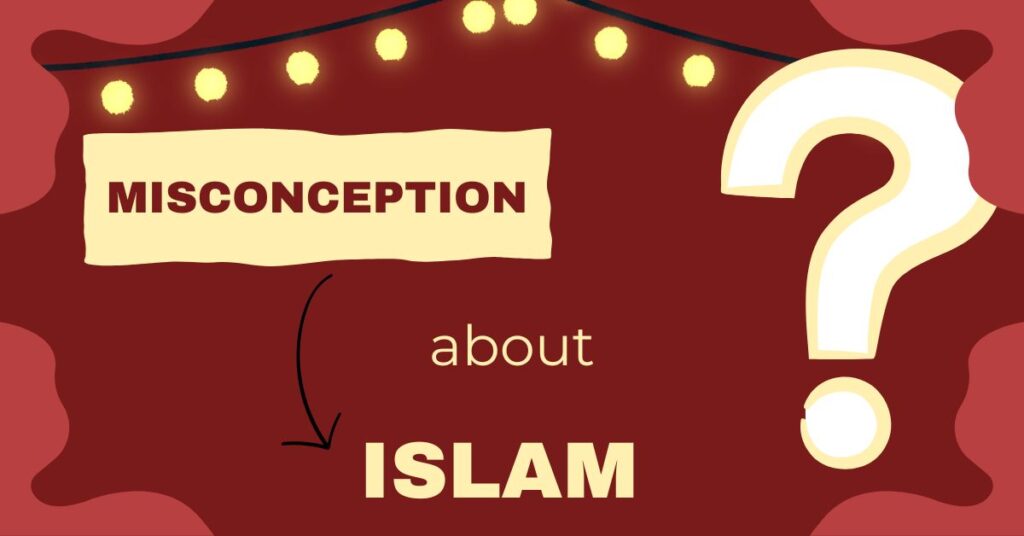Common Misconceptions About Islam — And the Truth Behind Them

Even though Islam is practiced by nearly 2 billion people worldwide, it’s still surrounded by a lot of misunderstandings.
Common misconceptions about Islam are often spread through media, movies, and sometimes even well-meaning but misinformed people.
Today, let’s walk through some of the biggest myths and uncover the real beauty of Islam based on authentic teachings.
1. Islam Promotes Violence
One of the most common misconceptions about Islam is that it encourages violence.
But if you dig into Islamic teachings, you’ll find that Islam actually stands for peace, mercy, and justice. In fact, the word “Islam” itself comes from the root word for peace (Salaam).
Sure, Islam talks about fighting — but only in the context of self-defense and protecting innocent lives.
Allah clearly says in the Quran:
“Fight in the cause of Allah those who fight you, but do not transgress limits; for Allah loves not transgressors.” (Quran 2:190)
The life of Prophet Muhammad (ﷺ) shows countless examples of patience, forgiveness, and peaceful resolution — even when he had every right to retaliate.
2. Muslim Women Are Oppressed
Another common misconception about Islam is that Muslim women are somehow oppressed or treated unfairly.
The truth? Islam was revolutionary in granting rights to women — rights to education, ownership, marriage consent, and inheritance — over 1400 years ago.
In Islam:
-
Women can own property and businesses.
-
They can seek education (it’s actually obligatory for both men and women).
-
They have full rights to choose (or reject) a marriage proposal.
As for the hijab, it’s not a tool of oppression. For millions of Muslim women, it’s a badge of empowerment, dignity, and faith.
Prophet Muhammad (ﷺ) said: “The best among you are those who are best to their women.” (Tirmidhi)
3. Islam Was Spread by the Sword
A lot of people think Islam expanded only through violence. This is a huge common misconception about Islam.
History shows that Islam often spread through trade, character, and peaceful interaction, not through force.
Take Indonesia, for example — the largest Muslim country today. Islam reached it through merchants and scholars, not armies.
Plus, Allah makes it very clear:
“There is no compulsion in religion.” (Quran 2:256)
Forced conversions go completely against Islamic teachings.
4. Muslims Worship a Different God
Here’s another common misconception about Islam: that Muslims worship some different or new god.
Not true. Muslims believe in the same God worshiped by Jews and Christians — the God of Abraham. In Arabic, “Allah” simply means “The God.”
Arab Christians even call God “Allah” today.
Islam, Christianity, and Judaism all share major beliefs:
-
One God
-
Reverence for Prophets
-
Belief in the Day of Judgment
So no, Muslims aren’t praying to someone else — they’re worshipping the same Creator.
5. Jihad Means “Holy War”
When people hear “jihad,” they often think of violence, but this is another big common misconception about Islam.
The word Jihad simply means “struggle” — and the greatest struggle is the internal one: resisting evil, doing good, and living righteously.
Sure, defensive fighting can be called jihad in certain cases, but that’s only one small part of a much bigger picture.
Most of the time, jihad is about striving to:
-
Be a better person
-
Help others
-
Stay firm in faith
As Prophet Muhammad (ﷺ) once said after battle:
“We have returned from the lesser jihad (battle) to the greater jihad (the struggle against the soul).” (Bayhaqi)
6. Muslims Don’t Believe in Jesus
Here’s a surprising common misconception about Islam: that Muslims somehow reject Jesus (peace be upon him).
In reality, Muslims deeply respect and love Jesus — known as Isa (عليه السلام) in Arabic.
Muslims believe:
-
Jesus was born miraculously to Mary (Maryam) without a father.
-
He performed miracles by God’s permission.
-
He is the Messiah and will return before the end of time.
However, Muslims don’t worship Jesus — they worship the One who sent him, just as Jesus himself preached.
“The Messiah, Jesus, the son of Mary, was no more than a Messenger of Allah.” (Quran 4:171)
7. Sharia Law Is Harsh and Barbaric
You’ve probably heard about this common misconception about Islam too: that Sharia law is nothing but brutal punishments.
But that’s a shallow and often media-driven image of what Sharia really is.
Sharia is a comprehensive guide to living ethically. It covers:
-
Prayer
-
Charity
-
Business ethics
-
Family laws
-
Personal morality
The harsh punishments you hear about are extremely rare and surrounded by strict conditions — way stricter than what’s often portrayed.
And in reality, most Sharia issues deal with kindness, fairness, and everyday life matters.
Final Thoughts: Understanding the Real Islam
At the end of the day, common misconceptions about Islam exist mostly because people rely on stereotypes rather than real knowledge.
Islam is a religion built on peace, compassion, and justice. It’s not perfect because of its followers — it’s perfect because it’s from God.
By learning directly from authentic sources and meeting real Muslims, we can break down the barriers caused by misinformation.
If you found this post helpful, share it! Together, we can challenge common misconceptions about Islam and spread understanding, one conversation at a time. 🌟
For more blogs The Four Imams and Their Madhabs- What Every Muslim Should Know -2025

